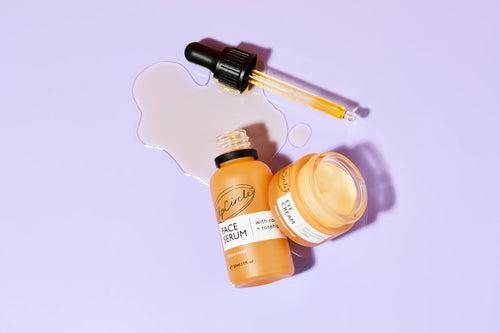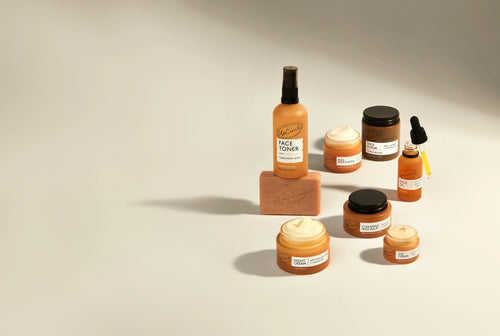The latest trend to hit our Instagram feeds from South Korea is fermented beauty – both skincare and haircare. We’ve heard about how great fermented foods are for our health, but what about for skin and hair?
Here, we look at what fermented skincare and haircare are, fermented ingredients, and consider how effective the ingredients might be.
What you need to know about using ferments
You’re probably familiar with the concept of fermentation from the foodie scene. From kombucha to kimchi, and sauerkraut to kefir, many of us have started to understand that fermented foods are good for us.
This is because they are natural probiotics – a great way of adding good and beneficial microbes to our gut and digestive tract. This feeds and populates our gut microbiome, which can help bolster immunity to reduce depression.
But our skin also has its own microbiome – the collection of healthy and beneficial microbes that live on and in your skin – as does the scalp and hair. Skin is the first line of defence against many harmful bacteria, so a healthy skin microbiome is important. The best fermented skincare is believed to nourish and populate your skin and hair microbiome, in the same way as probiotics nourish your gut microbiome.
With fermented foods, the food stuff is fermented to make the final product. So, for example, cabbage is fermented in salt to make kimchi, and grapes are fermented in yeast to produce wine. It’s a similar process for fermented beauty products; ingredients are fermented to increase potency and encourage microbial growth.
Fermented ingredients in skincare and haircare are all natural, being derived from nature. Fermented mushrooms are quite a common fermented skincare ingredient and are hailed for their natural anti-inflammatory qualities, as well as being a powerful antioxidant. Other common fermented ingredients in skincare and haircare include rice and ginseng root.
When it comes to your gut microbiome, variety is the spice of life – a diverse microbiome brings the most benefits. So let’s bring the same mindset to our haircare and skincare.
Do fermented products work?
So, it all sounds very promising and interesting, but does fermented skincare and haircare work?
Fermentation has long been understood in ancient cultures to bring health benefits. Western science is catching up, and the benefits of a healthy gut microbiome, aided by fermented foods, are now widely understood.
Some of this science can be overlaid onto fermented beauty products. We know from the research that fermentation breaks down ingredients and cultivates microbial diversity. It’s then believed that these ingredients, once broken down in skincare and haircare, can more easily permeate the skin and strands, delivering the benefits more effectively and directly. The basic science is that fermentation breaks down active ingredients into smaller molecules, which can then be more easily absorbed.
Fermented ingredients have increased potency, making these ingredients particularly effective for supporting a healthy skin barrier. This, in turn, is important for the overall health of your skin, potentially reducing issues such as inflammation or sensitivity. Research indicates that in fermentation by microorganisms, the concentration of the useful compound is increased or new phytochemicals are introduced, which enhances their biological activity. As more research is conducted into cosmetic applications of ferments, we’re finding new and innovative ways to use them.
Fermented hair care
Knowing that fermentation increases an ingredient’s potency, we were so excited to use a ferment in our Hair Serum. Fermented rice water is incorporated into the formulation, alongside betaine from sugar beet molasses to soften hair and boost elasticity; upcycled baobab extract to repair, strengthen, and protect against UV damage; aloe vera extract to calm and soothe the scalp; and coconut oil to restore softness without heaviness.
Rice water is brimming with vitamins, amino acids, minerals, and antioxidants to help nourish your strands and promote stronger, healthier hair. By fermenting the water, the pH is altered, making it gentler as you apply, and the antioxidant content is boosted, helping it to strengthen your locks and reduce frizz.
Additionally, instead of silicones, this product uses a Heat Protection Complex derived from mushroom extract rich in natural saccharides to shield hair from humidity for up to 24 hours. This improves straightening and helps styles last longer with less heat. As with every UpCircle product, it’s vegan and cruelty-free. This formulation is designed to suit all hair types – especially dry, frizz-prone, or heat-styled hair.
What works well with fermented skincare?
If you like the sound of fermented skincare but aren’t sold on it yet, do you have alternatives?
We believe that many of the same benefits of fermented skincare simply come from choosing natural vegan skincare products and ingredients that work with your skin, not against it.
For example, coffee is a powerful antioxidant, which bolsters your circulation, making your skin appear more radiant. Apricot powder is rich in vitamin E, helping to ensure healthy, supple and strong skin, and custard apple is a powerful adaptogen.
Choosing skincare products that use herbs, fruit, and other natural products, such as shea butter, ensures your skin is happy and hydrated. Many of these natural skincare products will also naturally include the same microbes that you find in fermented skincare, supporting your skin microbiome. Again, choose products that use a diversity of ingredients for the healthiest skin.
A good variety of natural vegan skincare that you might choose for skin health includes:
- Organic Face Serum with Coffee Oil – Rich in vitamin C as well as antioxidant-rich coffee, choose this face oil to boost collagen, fade dark spots and brighten your complexion.
- Cleansing Face Balm with Apricot Powder – Benefit from vitamin E-rich apricot powder in this gentle cleanser for all skin types.
- Face Toner with Hyaluronic Acid – Choose this face toner with hyaluronic acid, as well as vitamin C-rich mandarin juice water and chamomile to soothe and hydrate skin.
See our full collection of vegan and cruelty-free skincare, bodycare, haircare, and fragrance, using upcycled ingredients that would otherwise go to waste.







